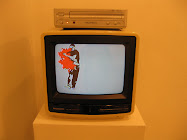Born in 1980
(after “Born in 1925”, Lyotard 1948)
No one knows whether this youth of ours is a youth. We fly the flag of old age; that “nothing is new anymore” while clamoring for the fashion, or approximation, of a “new” that satisfies us with whims and toys. To be honest we must not eliminate the parts of our generation that give themselves to faith, to unerring belief. Questioning is not our strong suit. We are embodied by indifference, submissive or ambitious, and reject maturity even when we seem to accept the roles of our fathers. Here we have no definition of what we are, and make no attempt to define ourselves.
We were eight when the Berlin Wall fell, and nine when the
This servility frees us from the dogma of change. We submit to fashion. The strongest of these fashions is Pentecostalism. A wave of Christianity sweeps the
On 11 September 2001 the alienation that lies at the origin of the repression practiced in
The great movement to democratize, Rock and Roll, has also lost its truth. Originating with Chuck Berry in the mid-century Rock and Roll faced a crisis after
We have begun to change. Expression has not found its proper gait, but the world begins to change around us. In
We have found our dream in ourselves. How distant is the claim that we are all equal? We are all subject to capitalism, to cost benefit analysis. Inefficient use of capital is corrected, fire extra employees, move jobs internationally; take smokers off of health insurance. But who among those born in 1980 would not rather have been born?
I hope I am speaking about most of the youth; the democratization of experience through television is widespread and entertaining. I do not know if we still have an “intellectual youth”, for young people in America today (and many the world over) have absorbed the traditional rites of the avant-garde without desire (and the avant-garde has been abandoned). We are self-absorbed, isolated in experience yet experiencing personal sensory experiences second-hand from media about events. The act of viewing becomes our first-hand experience and as we begin to choose representations based on their resemblance to reality the second-hand becomes more real. Out of our isolation we breed ambition, and conversely our ambition breeds separation. The latter is especially felt by the rich and the breakdown of the remnants of civility in the aristocracy. Adventure becomes survival in the current leisure class at the breakneck pace set for it by capitalism. Many take it on themselves to work second schemes, jobs or studies; many others are obligated to. In short, we are in a state of congruence, with the decay of the truth and a desire for reality as our common denominator.
This agreement occurs in all perspectives. In art, great painters are no longer those who possess skill or have something to say, but those who have hype- who are easily reproducible and able to be written about. In politics the same is true. And so on. We question being by attempting to describe an event, any and all events, as real. In thirty years we will have found a meaning for this empiricism; and deconstructed a civilization. But we will have lived in the interim.
We still have to make due with the world, to take threats of war seriously, to think of our future. We are excited to be representing the situation that we create. We will make the image of humanity, and we don’t give a damn for tradition. Let’s choose an extravagant personal adventure.






















